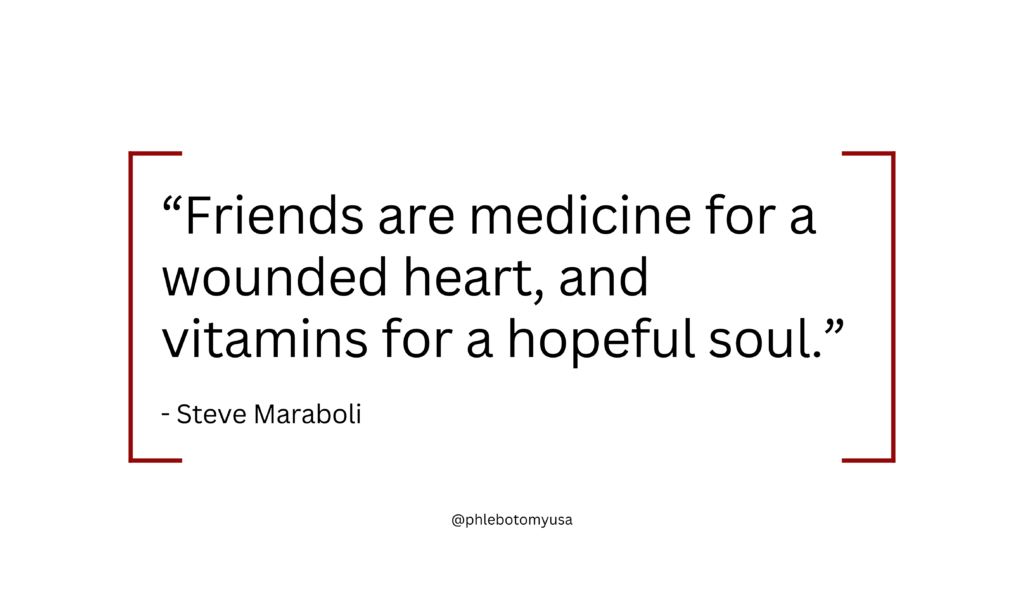29 Jan The Importance Of Friendships And Why They Keep Us Healthy
Have you ever felt happier and more energetic after spending time with friends? It turns out there’s a good reason for that! Friendships do more than fill our hearts; they also have amazing benefits for our health. Research has consistently shown that the bonds we form with our friends can hugely impact our physical and mental health.
From stronger immune systems to longer lives, the benefits of having friends are remarkable. In this article, we’ll explore the importance of friendships and how our friendships help us lead lives that are both healthier and more enjoyable.
Understanding Friendship
Friendships are an important part of the human experience. It’s not just companionship or good times that they provide. Friends are a “chosen family,” providing emotional support and personal development. Beginning in childhood, friendships help children to develop social skills and self-esteem. As we grow to adulthood and old age, they provide a sense of belonging and emotional support.
From a young age, friendships help children develop important social skills and self-esteem. As we age, these relationships continue to provide us with emotional support and help us to face life’s ups and downs. The importance of friendship cannot be overstated, as these bonds shape our lives and impact our health in profound ways.
Toxic Friendships ≠ Health
Not all friendships are good for you. The quality of friendships is important. Positive friendships bring health benefits with friends who are respectful, kind, and trustworthy. However, toxic friendships, are argumentative, unsupportive, and stressful.
These bad relationships can increase stress and anxiety, harming your mental and physical health. Stress from toxic friendships can lead to issues like heart disease, high blood pressure, and a weakened immune system. It’s important to focus on healthy, supportive friendships and distance yourself from harmful ones.
The Ideal Number of Friends
Research shows that having 3-5 close friends along with a larger group of acquaintances, is best for health and happiness. However, the number isn’t what matters most — it’s the quality of your friendships. About 50% of people have three or fewer close friends, and 13% have ten or more.
While a big social circle is nice, the real value lies in having close friends who offer emotional support, companionship, and security. These friendships help us handle life’s challenges and have the greatest impact on our mental and physical health.
The Health Benefits of Friendships
Without a doubt, we know that high-quality friends have a big impact on our health. Now let’s talk about how. Here are some of the key health benefits that friendships bring into our lives:
Longer Life
Friendship isn’t just heartwarming; it’s heart-saving. Studies show that strong social connections can reduce the risk of early death by up to 50%. That’s as beneficial as quitting smoking!
Less Stress
Friends are natural stress-relievers. Social interactions trigger the release of a happy hormone called oxytocin. This reduces anxiety and makes us calm. What’s more, studies show that social support protects our hearts from the bad effects of stress.
More Immunity
Surprisingly, our social lives affect our immune system. Research has found that people with many social ties are less likely to get sick.
Healthier Heart
The more social connections you have, the less likely you are to get heart disease. This study showed that loneliness is as harmful to the heart as smoking or obesity.
Better Mental Health
Friends are our emotional anchors. Having meaningful friendships lowers the risk of depression and anxiety and improves existing conditions.
Improved Brain Function
Friendships might even keep our minds sharper. This study found that social interaction improves mind functioning, maybe even lowering the risk of dementia.
How to Nurture Good Friendships
It’s important to put work into friendships to keep them healthy and strong. For some people, this may come easily. Others may have to work at it. A strong friendship is respectful, understanding, and supportive. It requires effort and attention from both sides. Here are some ways to nurture these important relationships:
- Be Open and Honest: Make sure each friend feels safe to speak freely. Friends should feel comfortable sharing their feelings.
- Show Empathy: Be understanding and empathetic towards each other’s experiences and emotions.
- Be Consistent: Regular interactions, whether in-person or on the phone, keep the friendship active and strong.
- Be Supportive: Be there for each other during difficult times. Friends should offer support and a listening ear.
- Celebrate Each Other: Share in each other’s achievements and happy moments, showing genuine happiness for one another.
- Be Appreciative: Show appreciation for each other and respect each other’s boundaries and differences.
- Make Time: Engage in activities and experiences together to strengthen the bond and create lasting memories.
- Be a Giver: Friendships should have a balance of give and take. Each should contribute equally to the relationship’s growth.
Friendships are more than just fun; they’re extremely important. When we have good friends, we’re not just happier, but we’re healthier too.
As we train the next generation of phlebotomists at Phlebotomy Training Specialists, we emphasize the value of building strong, supportive relationships with colleagues and patients alike. For more insights into health and wellness, visit our blog, or explore our locations to learn more about our programs.
Nurturing our friendships ensures that they are high-quality, lasting, and beneficial to everyone involved. So, remember to take care of your friendships because they take care of you, too.


